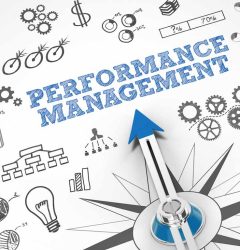11 Apr

With the changing workforce, the days of traditional  performance management are left behind. A recent survey reveals that today 75% of corporates either have already switched or are in the transition phase or are planning to switch to a more modern performance management practice in order to boost employee engagement and drive productivity.
performance management are left behind. A recent survey reveals that today 75% of corporates either have already switched or are in the transition phase or are planning to switch to a more modern performance management practice in order to boost employee engagement and drive productivity.
In fact, every organization is unique and has a distinctive performance management process. Many organizations plan to re-structure their performance management thoughts in 2017. They are now emphasizing on total employee development to facilitate employee engagement. A post by Institute for Corporate Productivity (i4cp) mentions that 2/3rd of the companies are re-engineering their current performance management practices.
Here are few shifts:
Switching From Annual Reviews To Regular Feedback Conversations
Organizations are facing the issue of having worthless and one-sided analysis when it comes to traditional performance reviews. Managers and employees meet once or twice a year to discuss the past performance but lack concrete performance records and are essentially reviewing what has happened in the past with the no opportunity to redefine the future.
Shift- Agile, recurrent and real time feedback sessions focus on involving managers and employees in the conversations. The performance review discussion happens periodically and helps to resolve the problems on real-time basis. Management can also have first-hand information on the subjects regarding employee performance and are in a state to take corrective action to facilitate guidance/course correction ensuring employees accomplish goals
Supportive Leadership Receives More Limelight
Talking about traditional ways to evaluate an employee, the process has been one way focused. Employees do not feel at ease since they lack the ability to change their goals as and when the business needs of the organization changes. This results in unproductive behaviour among employees.
Shift– With the changing employee’s expectations, having a two way communication ensures that managers and employees both share the same ideal scenario. It facilitates employees to voice out their opinions whenever they have any doubt. Supporting an employee ensures that they work hard to achieve their end goals.
Quality Wins Over Quantity
Defining goals for an employee conventionally meant aligning with the competencies of the organization. Employees need to meet the deadlines and deliver results hitting the company’s goals. The quality of the work kept on compromising itself to fulfil quantity.
Shift– Leaders now focus on consistent skill development of their employees and support their career growth. Managers meet this need through various means like setting performance goals with consideration of an employee’s professional plans, regular feedback, training and recognition for their work. Developed employees show a greater transition in performance and thereby, increasing productivity.
Flexible Goals Provide Greater Acceptance
Setting rigid goals for every employee for the entire year leaves no window for any change. Employees are reviewed at the end of the year and their reviews depend on the fulfilment of goals. Incompletion of goals due to unanticipated change hampered their reviews to a high extent.
Shift– Every employee is a unique identity in itself and works at a different pace. Individual goals should be defined keeping in mind its alignment with team goals for consistent growth and development. These should be flexible enough to adapt to the change as and when required considering business needs.
Technology
Doing away with annual reviews/ratings without a structured framework for ongoing performance management will result in little communication between managers and employees because the current technology tools are not capable to support this.
Shift– This is where new age real-time, agile, continuous feedback based platforms will ensure that employees receive online feedback. These platforms enable agile objectives and shorter-term priorities to be agreed and monitored, employees to receive and request real time feedback, trigger automated reminders to ensure employees and their manager’s check-in with each other regularly, and give HR and leadership clear visibility of whether regular performance discussions are taking place.
Peoplecart is an integrated web & mobile platform that enables modern performance management practices to be implemented with ease. Peoplecart’s platform framework combines applications for agile goal management, social recognition and rewards gamification with tools for employee engagement to deliver enhanced workforce capabilities.


